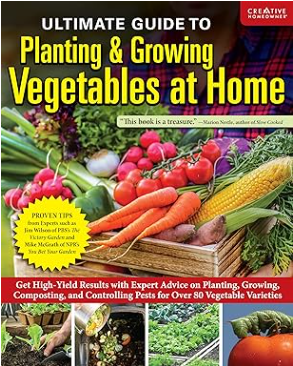I’m on the visionary panel. To register, click here.

Editors of Creative Homeowner. Ultimate Guide to Planting & Growing Vegetables at Home: Expert Advice for Planting, Growing, and Controlling Pests for Over 70 Vegetables. Creative Homeowner, 2025.

Part of my blurb ended up on the front cover:
Ultimate Guide is just that–an indispensable source of wisdom and deeply practical advice for any vegetable grower. Professionals as well as beginners will learn much on every page. This book is a treasure.
I have a garden on the terrace of my New York apartment (I’m currently harvesting the last of the blueberries and raspberries), so was especially happy to be sent this book. Here are some excerpts.
From the section titled, Grow What You Like
Your vegetable garden is all about providing you with great things to eat, so start by listing all the fruits and vegetables that you and your family will enjoy…The reality is that if you are putting your precious time into growing something, it should be a vegetable that’s a staple in your kitchen.
From: Using compost
Hungry plants such as potatoes and members of the brassica (cabbage) family make the best se of compost or worm compost. Apply before sowing or planting in spring and early summer. Winter brassicas such as Brussels sprouts and sprouting broccoli can benefit from a second application in July or August. In poorer soils, vegetables such as squash, Swiss chard, onions, beans, and beets will also benefit from the application of compost…Worms might not be the most beautiful of creatures, but they are exceptionally effective at producing rich compost.
From: Dealing with garden critters
For any gardener who has experienced the devastating effects of a rabbit in their garden, chicken wire (also known as poultry netting) is an absolute must…It is important to use netting with 1″ (2.5cm) holes and a width of 48″ (121.9cm)…If you follow these instructions to install chicken wire around the entire area to be protected, the crops will be completely safe from attacks by rabbits
From: Never let weeds get out of hand
The trick is to dig weeds out of beds and aisles before they go to seed or spread a network of perennial roots. But keep in mind that every time you disturb the soil, you expose a few
more dormant weed seeds. Take a dandelion digger with you on your weed safaris. With its small, V-pointed, long-shank blade you can cut roots deep in the soil and pull the weed out with little disturbance. Throw weeds into your compost pile. If you leave them where they pulled, they may take root and regrow…If you pull, dig out, or hoe weeds as soon as you see
them, and don’t allow them to go to seed, you will soon reduce the number that sprout in your garden. While weeds among your vegetables might attract beneficial insects, weeds compete strongly with vegetables for plant nutrients and soil moisture.